Nordic conference on the latest research in sustainable health
On June 14–16, Halmstad University hosted the tenth edition of the Nordic Health Promotion Research Conference. The conference gathered researchers from all over the world to discuss and share knowledge about health promotion and its importance for people’s health and well-being. This year’s theme was inspired by the UN’s goals for sustainable development.
“Our research must remain relevant. Our activism and sense of reality are the most important things we have to contribute.”
Evelyne de Leeuw, Professor of Urban Health and Policy and one of the conference’s keynote speakers
The Nordic Health Promotion Research Conference is an important arena for research in health promotion. The tenth edition of the conference was arranged by Halmstad University and included a range of lectures, presentations and roundtable discussions that explored different parts of health promotion.
Over 150 researchers from Sweden, the rest of the Nordic countries and other parts of the world participated in the three-day conference, which was opened by Anders Nelson, acting Deputy Vice-Chancellor at Halmstad University, and Eva-Carin Lindgren, Professor in Sports Science at Halmstad University and Chair of the Organising Committee.
“The preparations for this conference began two years ago, and now we are finally here to strengthen our commitment when it comes to health promotion,” said Eva-Carin Lindgren in her welcome speech.
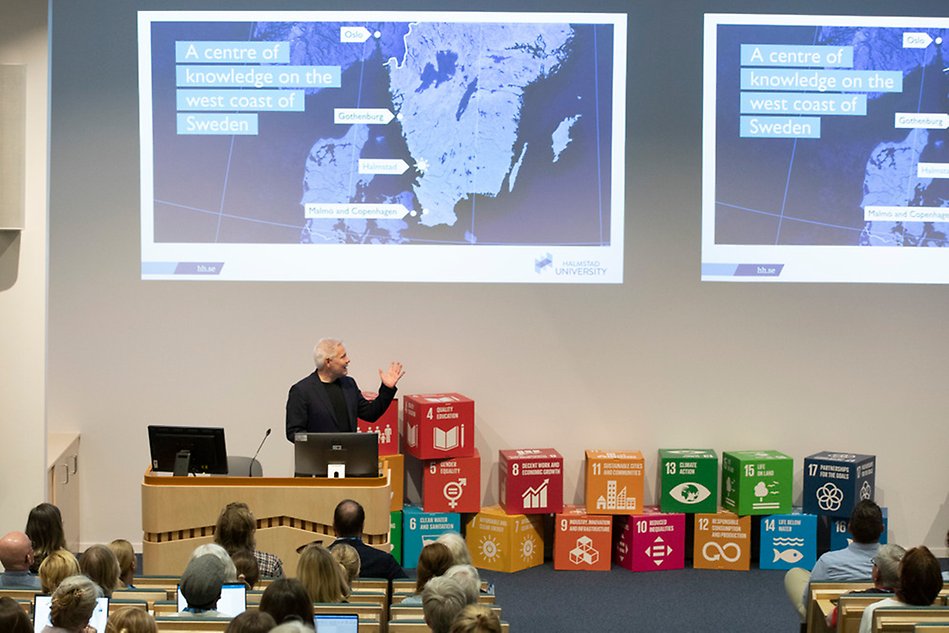
Anders Nelson, acting Depute Vice-Chancellor, welcomed the participants with a presentation about Halmstad and the University.
Focus on good health and sustainability
The focus of the conference was on good health and well-being, which was inspired by the third goal in the UN’s Agenda 2030 for sustainable development. The researchers discussed how health promotion can contribute to the goal, which goes by the same name as the conference focus, and what must be done for health promotion to help people both today and in the future.
The conference consisted of three sub-themes: equal health and social justice, e-health and how digital tools can be used for health promotion, and how to work with physical activity and sports to help people increase their wellbeing and become healthier.
During the three days, a variety of lectures were given, for example on AI in healthcare, mental health, digital health coaching, motivation to exercise and live sustainably, health among young people, the elderly and immigrants, and living with chronic diseases and addictions. During the coffee breaks, visitors could take part in a large poster exhibition that presented the latest research within all three sub-themes.
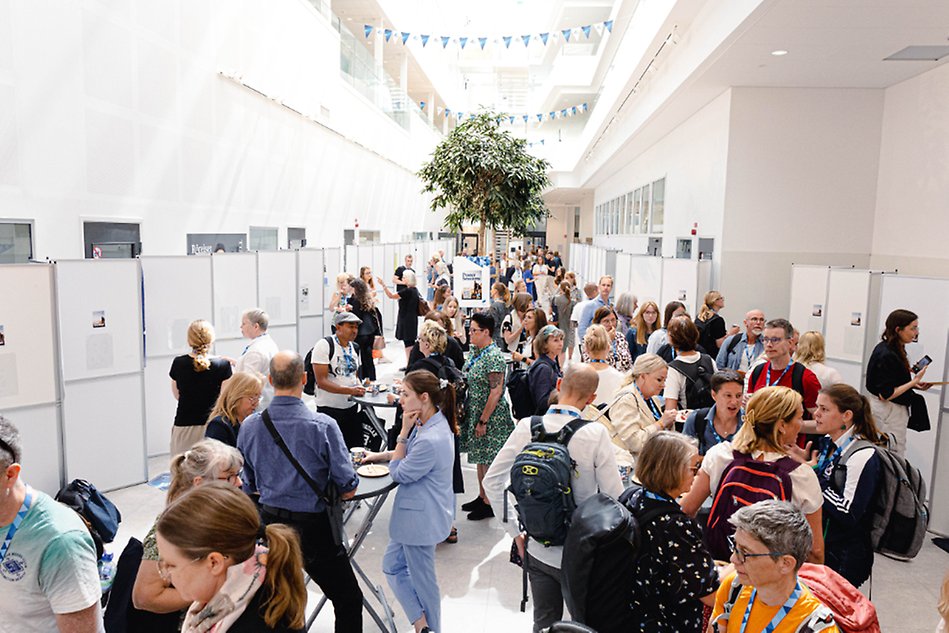
The poster exhibition was well-attended.
Health as a concept needs to extend beyond humans
The two keynote speakers at the conference were Evelyne de Leeuw, Professor of Urban Health and Policy at the University of New South Wales in Australia, and Sir Michael Marmot, Professor of Epidemiology at University College London in the UK. They both spoke about health promotion from a global perspective.
Sir Michael Marmot spoke about the challenge of an unequal world, and what efforts must be made to maintain sustainability beyond Agenda 2030. At a time when statistics show that the gap between rich and poor is increasing and the poor are paying for it with their health, Sir Michael Marmot has through his research developed a number of principles that can counteract this trend. One is about a safe childhood, another about education. Working against discrimination is a third.
Sir Michael Marmot’s principles
- Giving every child the best start in life.
- Enabling all people to maximise their capabilities and have control over their lives.
- Creating fair employment and good work for all.
- Ensuring a healthy standard of living for all.
- Creating and developing healthy and sustainable places and communities.
- Strengthen the role and impact of ill health prevention.
- Tackle racism, discrimination and their outcomes.
- Pursue environmental sustainability and health equity together.
“The world can sometimes seem quite depressing. Fast food is usually the cheapest food per calorie. Socio-economically deprived areas often have more air pollution. When there was an energy crisis in Europe last winter, many people could not afford to heat their homes. But there are a number of Marmot cities that follow the Marmot principles, and in these you can see an improvement in public health,” said Sir Michael Marmot.
Evelyne de Leeuw agreed that health promotion must extend beyond just people and the planet, and that time must be seen as a crucial aspect when working with health promotion. The theme of her lecture was health without borders, and the challenges, risks and opportunities that exist for the next generation of health promotion.
“We need to involve entire ecosystems in our research, continue to learn more, and our research must remain relevant. Our activism and sense of reality are the most important things we have to contribute,” said Evelyne de Leeuw.
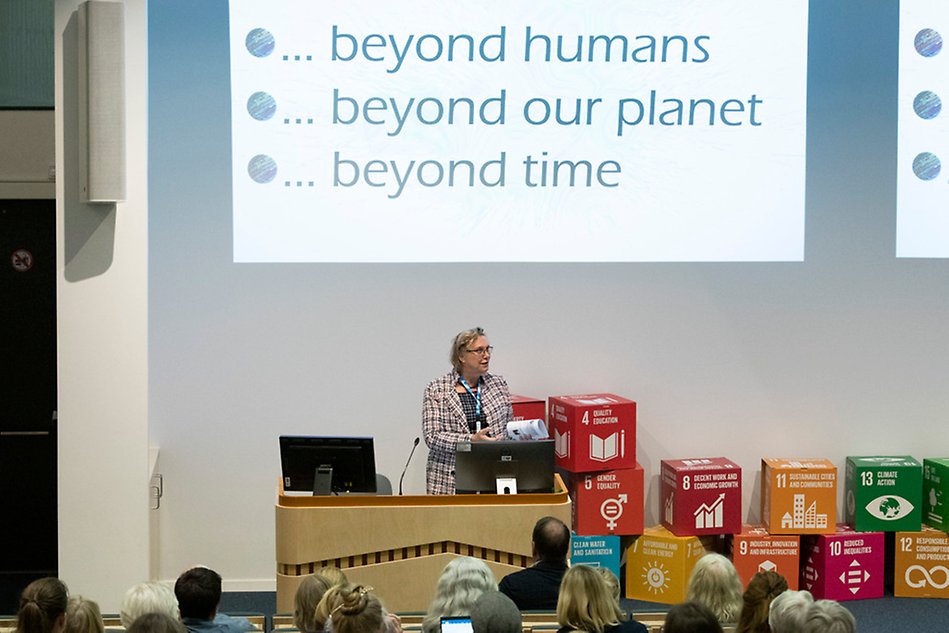
The theme for Professor Evelyne de Leeuw’s presentation was health without boarders.
Internal motivation and attractive arenas keys to sustainable exercise
Among the Nordic speakers present at the conference was Nikos Ntoumanis, Professor of Motivation Science at the University of Southern Denmark, whose presentation was about motivation and strategies that facilitate sustainable exercise and physical activity. Focusing on how behavioural science can support researchers in health promotion, he stressed the need for high-quality motivation for people to be able to change behaviours and start exercising.
As an example, Nikos Ntoumanis showed a study in which a group of sedentary football fans were given the opportunity to train at a football stadium and meet their idols, which gave the participants inner motivation to continue exercising and reach a healthy weight.
“Motivation comes from within. If a person’s psychological needs for autonomy, competence and relatedness are met, it is more likely that the motivation to change lifestyle occurs,” said Nikos Ntoumanis.
“The predispositions for children being active during their free time are more or less the same as for screens – it’s fun and social. The difference is that the screen provides constant rewards while there are no physical health benefits.”
Ellen Merethe Melingen Haug, Senior Lecturer in Health and Health Behaviour
Another Nordic speaker was Ellen Merethe Melingen Haug, Senior Lecturer in Health and Health Behaviour at the University of Bergen in Norway, whose lecture was about whether sedentary screen use is a threat to young people’s physical activity. She explained that screen use among young people has increased in recent decades, and that social media is now the main forum for communicating with friends. At the same time, it has become less common to be active in sports clubs and to reach the weekly recommendation on physical activity.
“There is a correlation between increased screen time and reduced physical activity among young people. The predispositions for children being active during their free time are more or less the same as for screens – it’s fun and social. The difference is that the screen provides constant rewards while there are no physical health benefits. To address the problem, we need to create attractive arenas for physical activity, where, for example, gaming and exercise are combined,” said Ellen Merethe Melingen Haug.
Hope for better care with AI
The conference did not only focus on sports and exercise. Lena Petersson, Senior Lecturer in Health Pedagogy at Halmstad University, gave a lecture on AI and healthcare, and which health promotion opportunities health leaders see with AI.
In interviews, leaders had said that they believe in possible benefits for patients such as individualised tools for self-assessment and information support. For staff they saw opportunities for diagnostic support, risk assessment and treatment suggestions, among other things.
“Overall, the healthcare leaders’ impression was that implementing AI applications might result in quality improvements that could benefit patients, healthcare professionals and organisations,” said Lena Petersson.
Researchers agents of change
One of the last items on the conference agenda was a panel conversation led by Charli Eriksson, Professor Emeritus of Public Health Sciences at Karolinska Institutet. The rest of the panel was made up by researchers Karoliina Kaasalainen and Sami Kokko from Finland, Terje Andreas Eikemo and Ellen Merethe Melingen Haug from Norway, and Henriette Langstrup from Denmark.
When the panel was asked which health promotion initiative is the most relevant right now, they gave a variety of answers, everything from education for young girls who have not returned to school after the pandemic and AI in healthcare to thinking globally while acting locally.
Charli Eriksson asked what lessons the researchers would take away from the conference, and again received several different answers.
“We are not just researchers, but also agents of change. Our mission must be equality and to fight inequity,” said Terje Andreas Eikemo, Professor of Sociology at the Norwegian University of Science and Technology.
“We also have to ask ourselves who benefits and who pays in a particular issue, as we look for solutions in areas that are very commercialised and not very transparent, and follow up with data and research,” said Henriette Langstrup, Senior Lecturer in Health Services at the University of Copenhagen.
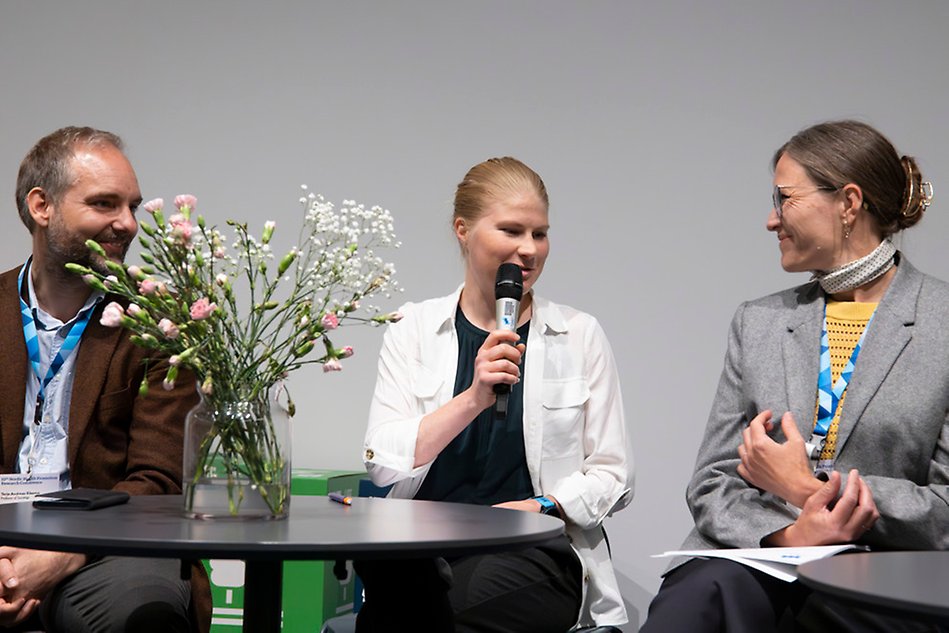
Terje Andreas Eikemo, Karoliina Kaasalainen and Henriette Langstrup were some of the researchers who participated in the panel discussion.
A healthier and more fair future
The closing remarks for the conference were given by Eva-Carin Lindgren, and two representatives from the Nordic Health Promotion Research Network responsible for the conference, namely Steffen Torp, Professor of Health Promotion at the University of South-Eastern Norway, and Bo Haglund, Professor of Social Medicine at Karolinska Institutet.
Bo Haglund thanked Halmstad University and the organising committee, and handed over to Steffen Torp, who revealed that the next conference – in three years – will be held in Norway. Where exactly is yet to be decided.
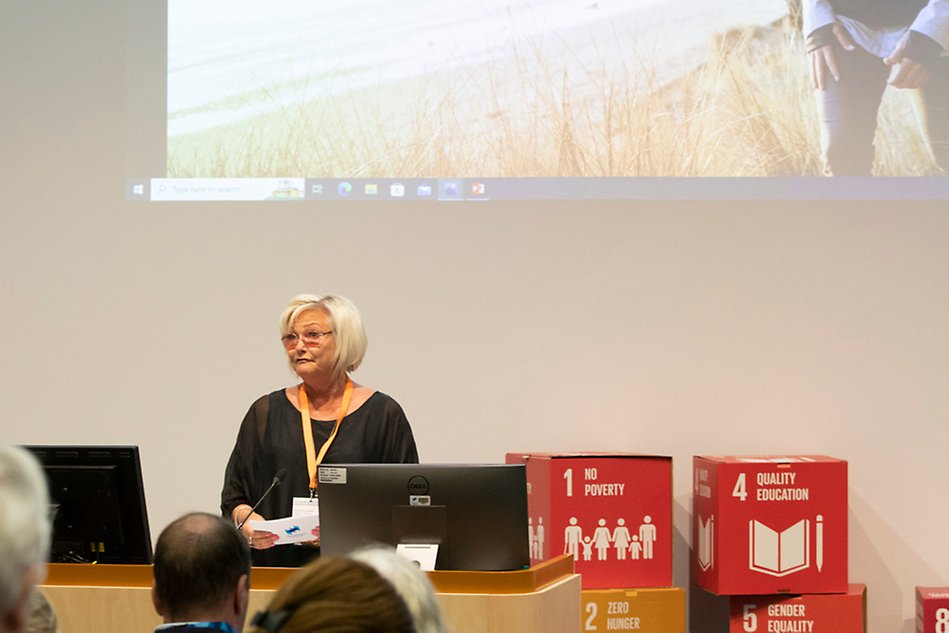
Eva-Carin Lindgren, Professor in Sports Science at Halmstad University and Chair of the Organising Committee, gave the closing remarks and thanked all participants.
“Over the past few days, we have witnessed an exceptional gathering of minds, ideas and expertise, all in pursuit of a healthier and more equitable future. The depth and breadth of knowledge shared throughout this conference have really been remarkable, leaving an impact on us all,” concluded Eva-Carin Lindgren.
Text: Emma Swahn
Photo: Dan Bergmark and Albin Edin

